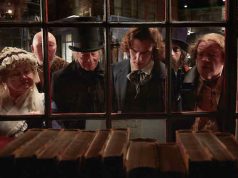Say whatever you want about “Jerry Maguire,” the last film directed by Cameron Crowe before his new “Almost Famous.” As far as I’m concerned, it’s “Say Anything” — that brilliantly funny, poignant and important “teen film” (though it defied that genre) from the ’80s — that made Crowe virtually infallible.
“Almost Famous,” in fact, is almost perfect. Semi-autobiographical, it begins in San Diego in 1969, when overprotective single mom Elaine Miller (Frances McDormand, off-kilter and funny as always) has finally caused teen daughter Anita (Zooey Deschanel) to move out. The issue? Rock music. (It’s all about drugs, you know.)
When Anita leaves, she tells her little brother William where her LPs are. He starts listening, and it changes his life forever….
Fast-forward to 1973. William (Patrick Fugit) is a would-be writer and a completely non-cool 15-year-old. Ambitious, though, he sends clips from his high-school paper to various rock ‘n’ roll-oriented publications. Creem editor Lester Bangs (Philip Seymour Hoffman) gives him a chance, but warns him about big-time magazines like Rolling Stone, where they’ll tear his words up and force him to be a hard-hitting journalist. Also, he warns, don’t get too attached to the bands you cover. If you like ’em too much, you won’t be honest in your writing.
William tries oh-so-hard to take this advice to heart, but soon he’s on assignment for Rolling Stone and — in a turn of events that’s almost TOO surreal, except that it’s true — touring with Black Sabbath opening act Stillwater (a fictitious band, though a group by that name did exist in the late ’70s). He grows to love this group, particularly lead guitarist Russell Hammond (Billy Crudup), who is carrying on with lead groupie Penny Lane (Kate Hudson), who doesn’t realize — or doesn’t care — that she’s just being used.
Can William write an insightful, non-fluffy piece about a group of people he loves so much? They trust him to paint a pretty picture of the band, and therefore aren’t afraid to have their fights and drug-induced stupors in front of him.
This is not a movie about journalistic integrity, though. Obviously crafted with a great deal of love, from the hand-written opening credits to the last musical note, Crowe’s story is about music, doing what you love, family, loyalty and self-worth. The humor in it comes naturally, with no set-ups or punchlines; just the regular flow of comedy that comes from real life. (Well, OK, there is the outrageous scene of a woman having her stomach pumped while Stevie Wonder’s “My Cherie Amour” plays.)
McDormand is fantastic as the worried mom, making her utterly realistic — no easy feat, considering how over-the-top she is in her overprotection. Hudson is no less remarkable as the world’s biggest groupie, a heart-breaking character who gives the film its wistful poignancy (a common feeling in Crowe films).
New-comer Patrick Fugit is impressive, too, as William. His struggles are real, and not just in trying to meet a deadline when the band is too giddy to sit down long enough to be interviewed. Here’s a kid away from home, doing what he loves but not loving what he’s doing, wondering if it’s all worth it, doubting his abilities — who hasn’t felt that way at some point? Fugit acts better than many of his peers twice his age, playing a demanding role with just the right mixture of awkwardness, enthusiasm and humor.
Crowe expertly avoids the pitfall of many “labor of love” projects, where the finished product is only interesting to the guy who made it. The film may not resonate with everyone — there is a strong emphasis on rock ‘n’ roll, with little attempt to universalize it — but it will surely strike a chord of nostalgia with any open-hearted viewer, particularly those who have learned that “family” can be the people you’re born with as well as the people you meet.
A- (; )




